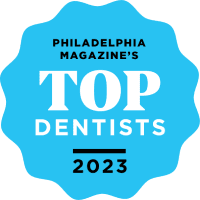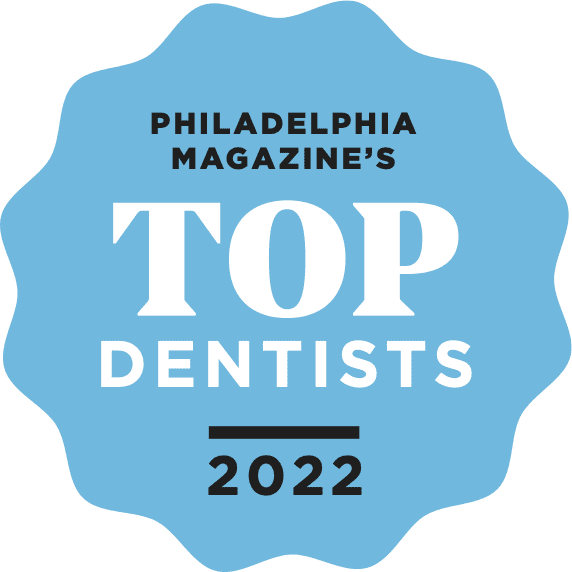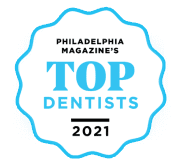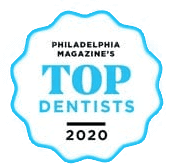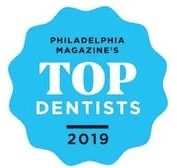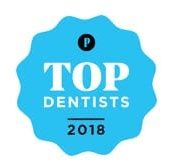Teeth grinding is a common habit that many people have. Bruxism, the medical term that refers to teeth grinding habits, is a serious dental problem. Bruxism causes severe damage to your mouth. Some people grind their teeth in their sleep and are not even aware they do it until a dentist finds the wear patterns on their teeth.
People also grind their teeth or clench their jaw while awake in response to stress or anxiety, and sometimes while hyper-focusing. If you find yourself doing this, seek bruxism treatment before serious damage occurs to your body.

Dr. Drew Shulman is a dentist in Northeast Philadelphia who has experience treating jaw clenching and teeth grinding. He can also correct the damage it can cause to the teeth using restorative dental treatments.
What Causes Teeth Grinding?
The cause of teeth grinding is unique from patient to patient. At your appointment with Dr. Shulman, he will ask you a multitude of questions to help figure out why. Night-time grinding is sometimes a symptom of sleep apnea and acid reflux. Sometimes caffeine, alcohol, tobacco, and recreational drug use can increase your teeth grinding habit.
Most patients we see at our Northeast Philadelphia dental office suffer from teeth grinding because of:
- Malocclusion – when the teeth do not properly align. This can cause the grinding of teeth as individuals try to adjust their bite unconsciously during sleep.
- Stress, anxiety or tension. High-stress levels or overwhelming emotions can lead people to grind their teeth, often during sleep.
- A Temporomandibular Joint Dysfunction (TMD).
- Some medications, particularly those that treat psychiatric disorders like depression and anxiety, can induce bruxism as a side effect.
Common Teeth Grinding Symptoms
One of the most noticeable symptoms of teeth grinding is tooth pain or sensitivity. Grinding can wear down the enamel on your teeth, making them more susceptible to pain in hot or cold temperatures. However, if you grind your teeth in your sleep, you may not even be aware you are doing it.
Another common symptom is jaw pain, sore jaw muscles, tight jaw joints or stiffness. The constant clenching and grinding motion puts strain on the muscles and joints in your jaw. This strain can lead to discomfort and limited mobility.
Individuals who grind their teeth also frequently report headaches, especially in the morning, as a symptom. The excessive pressure that grinding places on the jaw and surrounding muscles can radiate pain to other areas. This results in frequent or severe headaches, stress, migraines during the day and more.
The following are a few more telling signs that you grind your teeth:
- Worn down teeth
- Broken or chipped teeth
- Sensitive teeth
- General ear or face pain
- Tissue damage on the inside of your cheek
In some cases, teeth grinding can cause damage to dental restorations such as fillings, crowns, and dentures. If you notice any changes in your dental work, it could be a sign that you are grinding your teeth.
Treatment for Teeth Grinding
As a talented restorative dentist in Northeast Philadelphia, Dr. Shulman can help you find relief form teeth grinding (bruxism). His goal will be to help you pinpoint the cause, stop the grinding, and correct any damage. If you grind your teeth because of stress or anxiety, the simplest answer may be a lifestyle change.
Finding ways to reduce stress or relax, such as doing yoga, may be the key to helping you find relief from this habit. Stress management and relaxation exercises can go a long way in reducing the effects of teeth grinding. Controlling your stress and anxiety levels can even stop the habit altogether.
However, the cause may be because of a medical or dental issue. Dr. Shulman offers the following treatments for teeth grinding.
Oral appliance or splint therapy
Oral appliance therapy involves using special dental devices or appliances to manage the symptoms of teeth grinding and clenching. You may know these appliances as dental splints, bite guards, or night guards.
Dr. Shulman frequently provides oral appliance therapy as an effective tool to protect teeth from constant grinding if the patient is asleep. He creates each appliance from your dental impressions so that it fits perfectly over your teeth.
The main purpose of these appliances is to provide a barrier between the upper and lower teeth to prevent them from contacting. This helps to protect the teeth from damage during sleep, or even during the day.
However, oral appliance therapy does not treat the underlying causes of bruxism such as stress or anxiety. However, it can be an effective tool for managing the symptoms and preventing further damage to the teeth.
Bite Alignment Therapy
Bite Alignment Therapy is also known as Bite Correction Therapy, or Bite Balancing Therapy. BAT is a specialized dental treatment that focuses on adjusting and optimizing the alignment of a patients bite. A leading cause of TMJ disorders and teeth grinding is malocclusion. This is when the teeth are simply crooked.
The therapy addresses dental issues that relate to how the upper and lower teeth fit together when biting down. Using bite alignment therapy, Dr. Shulman can correct malocclusions and improve the way your teeth come together. We can bring teeth into proper alignment using several treatments including Invisalign® clear aligners, porcelain veneers, or dental crowns.
Repairing the Damage
If your teeth grinding has caused significant damage, Dr. Shulman offers many treatments to correct it. He may suggest repairing worn down, chipped, cracked or broken teeth with dental crowns, porcelain veneers, or teeth bonding. The repair option will depend on many factors, but the most important one is the root cause of the issue. Dr. Shulman will first evaluate and diagnose you before he repairs your worn teeth.
What is the main reason people grind their teeth?
Most people grind their teeth without knowing it. This is directly related to stress and is a physical release of stress in an involuntary manner. Grinding one’s teeth becomes a habit that can be hard to break. People may also grind their teeth because of depression, consuming excessive caffeine, or tobacco use.
Is teeth grinding harmful to my health?
Yes- teeth grinding can cause extreme damage to patients oral health. The pressure exerted on your teeth from grinding causes damage to their surface, and the enamel. Teeth grinding can impact a patient’s ability to speak clearly, eat, and sleep.
How can I know if I have been grinding my teeth at night?
Many patients get chronic headaches because of their habit of teeth grinding. The headaches usually occur in the morning. Patients may also feel neck pain or muscular tightness because of teeth grinding. Other symptoms you may be grinding your teeth are TMJ pain and insomnia.
If you notice that the surface of your teeth is worn-down, see your dentist for an evaluation to find the cause.
How can I stop or prevent teeth grinding?
The first step in breaking a habit is to find its source. For most patients the source of their teeth grinding is stress. Stress is a large overall issue, so finding exactly what is causing the patient stress is important. Then, attempting to help them deal with their stress in a healthy way can help stop them from grinding their teeth.
Wearing a mouthguard provides a physical barrier between the teeth. This protects the teeth and prevents any damage. However, the first thing to do to prevent teeth grinding is scheduling a regular dental exam today. Call Dr. Drew Shulman at (215) 372-1142, or request an appointment online.

